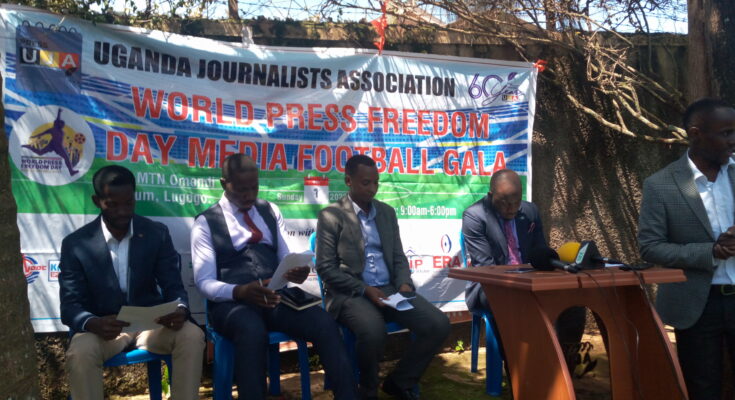Tuesday May 3 2022.
Warm greetings to you all fellow citizens and development partners. Led by the Uganda Journalists Association (UJA) an umbrella body that brings together all journalists in Uganda, we are gathering here today in this joint press conference held on Tuesday May 3 rd 2022 at our Home in Kawempe Municipality with other Journalists Associations; UPPA, CHOUMA, AMA, EJAU and Uganda Parliamentary Forum on Media (UPFM) in commemoration of our day, the 30 th World Press Freedom Day (WPFD), anniversary.
May 3rd acts as a reminder to governments of the need to respect their commitment to press freedom and is also a day of reflection among media professionals about issues of press freedom and professional ethics. It is also a day of remembrance for those journalists who lost their lives while in the line of duty.
WPFD celebrations were first officially proclaimed during the United Nations General Assembly in Windhoek Namibia 1993. The call for international calendar to observe the importance of media freedom was originally made at a meeting in Namibia when African journalists convened in partnership with UNESCO in 1991.
The international celebrations for this year are being held in Punta Del Este- Uruguay, under the theme; “Journalism under Digital Siege”, assessing the digital era’s impact on freedom of expression, safety of journalists, access to information and privacy. In other words, the theme is intended to highlight the multiple ways in which surveillance and digitally mediated attacks endanger journalists and journalism, according to the UN.
Surveillance is dangerous to journalism in the way that it exposes the information gathered by journalists, including from the whistle blowers, hence undermining the principle of source protection which is universally considered as a pre requisite for freedom of the media as enshrined in the UN
Resolutions.
Surveillance is also harmful to the safety of journalists since it discloses sensitive private information which could be used for arbitrary judicial harassment or attack.
Commemoration of 2022 World Press Freedom Day in Uganda comes at the time of increased Digital challenges which pose serious threats to journalism profession in Uganda.
Threats
– Although social networks and platforms have played a commendable role in disseminating information for example, combating Covid 19 infodemic, they have brought harm to journalism. They have created room for misinformation and disinformation (dissemination of inaccurate information) which should be addressed by all actors in the media sector before it adversely impacts the sector.
– There are repressive actions such as government use of digital tools to monitor journalists and their sources undermines journalism as well as threatening the safety of media workers.
– There is high internet cost in Uganda which highly impacts the flow and access of information in the media online platforms by the public. Case in point is tax on data by the telecom companies which was imposed by the government in 2020/21 FY budget.
– Persistent internet shutdown by the Uganda government negatively impacts journalism. It should be noted that there was a total shut of the internet from the eve of general elections until when results for presidential candidates were declared by the Electoral Commission.
– There is monitoring access to information which is witnessed by the government interference in the flow of public information. For example, government took advantage of Covid 19 pandemic to impose restrictions on disseminating information that is in public interest by trying to control messages.
Other Challenges against journalists in Uganda;
– Journalists’ economic rights have time and again been violated by some of their gate keepers and media house owners. While the law sets contractual requirements, a number of media practitioners continue to be employed without appointment letters and formal contracts.
Some of those that give out formal contracts mainly do it ceremonially to serve their selfish interests. Journalists are being retrenched and sacked at will, they are paid poorly, some are not facilitated to work effectively, they are denied insurance covers to address health risks arising from occupational hazards, for example during riots /protests, which all pose a serious impact to their welfare standards.
– Persistent attacks on the press (journalists) in form of torture, intimidation of license withdraws, clobbering, unwarranted arrests, detentions, damage of work tools, etc., by individual security personnel from the Police, Army, RDC’s and press regulators, have significantly had a bearing to the enjoyment of press freedom and journalism activities in this free and democratic society. Such acts by the men in uniform have left several journalists with physical impairment. 2021 elections and post-election period, November 2020-April 2021, provide detailed examples on the status of press freedom in Uganda. There is also misuse of laws to quell critical speech.
– Arbitrary directives by the government media regulating body the Uganda Communications Commission (UCC) have compromised the independence of journalism practices as well as resulting into loss of jobs by some journalists and denying the public access to right information. For example,39 journalists from 13 media houses were in 2019 told by the Commission through their employers to leave their jobs following the publication and broadcasting of the news which the government felt was not in its favor. This prompted journalists to seek legal redress and won the case.
– Arbitrary orders by the Uganda Media Council restricting the 2021 election coverage impacted journalists’ operations, rights and freedoms. This also compelled journalist to petition court to challenge the same.
Calling;
– Government through ministry of ICT & National Guidance, Labor, Gender and Social Development should ensure that the process of signing the Minimum Wage Bill 0f 2015 which was passed by parliament on Tuesday 19th February 2019 be fast tracked. We feel the bill will address challenges of journalists’ poor welfare if quickly signed into law, since it sets minimumwage for every worker.
– Invoking the current legal regime, Parliament should move Government through its oversight mandate to withdrawal licenses from the media house owners that aren’t capable to fulfill the obligation of paying their workers. Entrepreneurs that cannot satisfactorily maintain the welfare standards of their media staff should equally be denied license to open up a media house to prevent the media practitioners’ resort to extortion for survival, which is un ethical.
– Government through ministry of ICT & National Guidance, Labor, Gender and Social Development should push for the process of assenting to the Employment Amendment Bill of 2019 which was passed by parliament in early April 2021. Since its object is to operationalize the provisions of article 40 of the constitution to all categories of workers in Uganda, we believe that working conditions for journalists and other workers will fairly improve once it is a law. It will create provision for protection of working breastfeeding journalists (mothers) and facilities by employers. It will also prohibit employment of persons as casual employees for more than 3 months with the same employer as well as conversion of casual employment.
Parliament should equally ensure that all such good laws that have been passed by it achieve their objective for avoidance of wastage of the tax payer’s resources that are used in tracking them.
– National Policy specifically for insurance cover of press freedom actors (journalists) should be worked out given their vulnerability. It can work in harmony with the National Insurance Health Scheme Bill which was passed by parliament in March 2021.
– Government should waive taxes on internet to foster information access by the public. Parliament should ensure that all passed laws such as the Prohibition of Torture Act 2012, Enforcement of Human Rights Act 2019 to deal with errant individual security personnel are effectively realize their purpose.
– Security agencies should exercise restraint from occasioning attacks on journalists, always investigate their errant officers who allegedly violate journalists’ rights and there after disciplines the culprits.
Conclusion; despite prevailing challenges, we shall continue to use all tools at our disposal to engage and pressure government to prevail over the perpetrators of violations against us as.


